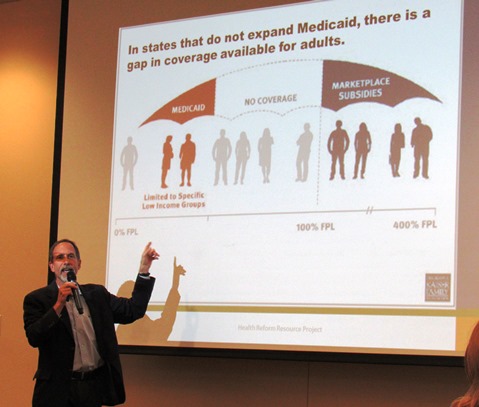by Mary Rupert
Advocates of expanding KanCare said at a community forum Thursday night that it would bring more than $49.7 million in additional health care spending into Wyandotte County.
An estimated 315 new jobs would be created in Wyandotte County as a result of KanCare expansion, according to the Alliance for a Healthy Kansas, which sponsored the community forum held at Donnelly College’s Event Center. KanCare is the name for Medicaid in Kansas, which serves low-income people. Alliance for a Healthy Kansas is a new organization representing more than 100 organizations that have come together on the issue.
Advocates and Wyandotte County legislators are somewhat optimistic about the chances of KanCare expansion in the Kansas Legislature this year, especially compared to last year, when the topic was not allowed to be debated by GOP leaders.
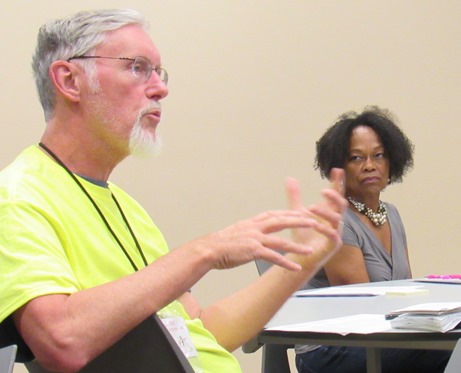
Local legislators interested in new expanded Medicaid bill
House Democratic Minority Leader Tom Burroughs said in order to pass an expanded KanCare bill, first they will have to come forward with the bill, something that they all can support.
Next, they have to see the makeup of the body of the Legislature this year, he said. The governor has made a statement the past couple of years that it is up to the Legislature to make the decision, but the governor has had the power all along to expand it, he said.
“The buck passing now has to stop,” Burroughs said.
Last year, some persons in the industry did not support a KanCare expansion bill and there was fallout from that, he said. Now this is a collaborative effort, and he said he commended different parts of the industry for coming together.
“Whatever we choose to do, the prudent thing is to make sure everyone is on the same page,” Burroughs said.
He agreed that everyone is paying more now for the uninsured, as the cost of health care and insurance goes up when these costs are absorbed into the system. Any step forward is good that allows for some recovery of the costs of the uninsured.
He said that while some new legislators may say they will support expanded KanCare, when the details of the bill come forward, some of them may change their minds. For example, some may not support it if it includes funds for Planned Parenthood.
State Rep. Pam Curtis, D-32nd Dist., said she was in favor of KanCare expansion and holding a debate on it, but a floor debate was not allowed last year after a bill came out of the Vision 2020 Committee, where she was a member.
She said the Medicaid expansion would help a lot of citizens with no access to health care and it would help a lot of communities.
“I’m a lot more positive about it this year,” she said.
As for the opposition that is ideologically against the idea of using federal tax money to pay for health care, she said, “We’re paying those federal dollars, they’re just not coming back to help us.”

More than 100 organizations join together for expanded KanCare
Alliance for a Healthy Kansas, which lists more than 100 organizations as members, including the Kansas Hospital Association, Kansas Action for Children, Healthy Communities Wyandotte, Wyandot Inc., Association of Community Mental Health Centers of Kansas, and the Wyandotte Health Foundation, is making a tour of Kansas with community forums, including one at Donnelly on Thursday night.
The forums promote KanCare expansion, citing statistics that say the local community and state would benefit. Also the alliance is gathering personal stories from residents of how the lack of the expansion has affected their lives and businesses.
Expansion of KanCare would help pay for the medical care for people who are underinsured or uninsured.
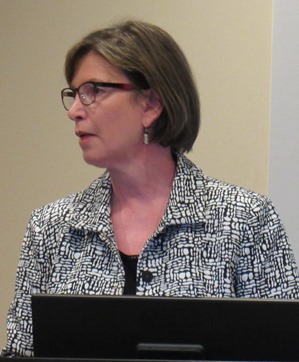
More than 15,000 uninsured receiving assistance at clinics here
Cathy Harding, president and CEO of the Wyandotte Health Foundation, which was started about 20 years ago when the former Bethany Medical Center was sold, said the foundation has invested $36 million through grants in the community, with more than $25 million going for clinics that serve uninsured low-income clients.
Last year, Wyandotte Health Foundation-funded clinics in Wyandotte County provided health care services to more than 15,000 uninsured individuals in Wyandotte County, she said. The foundation is left with very little to invest in other health projects that it would like to help, she said.
According to the Alliance for a Healthy Kansas, 11,759 Wyandotte County uninsured residents would gain health coverage if KanCare were expanded.
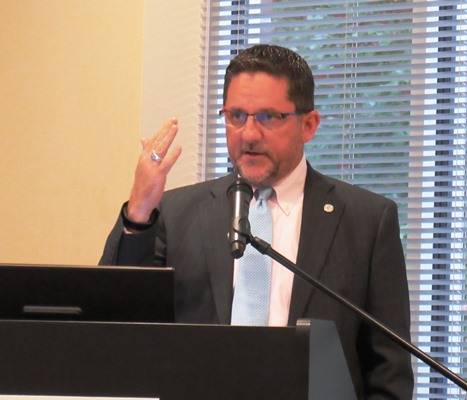
Mayor: ‘People ought to be outraged’
Mayor Mark Holland, who spoke at the forum, said Wyandotte County has 5 percent of the state’s population and 10 percent of the state’s uninsured residents. Kansas City, Kan., residents are 12 percent more likely to have cancer than people in other parts of the state, and 34 percent more likely to die of cancer than people in other parts of the state, he said.
He told a story about a Kansas City, Kan., woman who called 911 because she thought she had been shot. When police responded, they discovered the woman was bleeding and completely delirious, and needed to go to a hospital, he said. But she had not been shot, she had stage 4 breast cancer, he said. At that stage it is not curable. She had not received treatment for the earlier stages. The woman died from cancer a few years ago.
“When we deliver a patient in an ambulance with stage 4 cancer to the hospital, we sentence them to death, with zero treatment for cancer,” he said. “That should be unacceptable in a first-world country. We are the only developed country in the world that does not prioritize health care for all people, and our state is waging a war against the poorest of the poor every day, including refusing to expand Medicaid.
“You may not call yourself a Christian nation if you‘re not going to serve the poor,” he said. Holland said people ought to be outraged by what is happening to the poor.
“We’re going to sacrifice the poor of this state on the altar of income-tax cuts to the Koch brothers, and we’re going to let people be delivered by ambulance to the hospital to be sentenced to death for untreated cancer,” he said.
“I’m angry about it and I think it’s time other people got angry about it, and we stop tiptoeing around the political BS in Topeka, and call it what it is. It’s unacceptable,” Holland said, to applause from the audience.
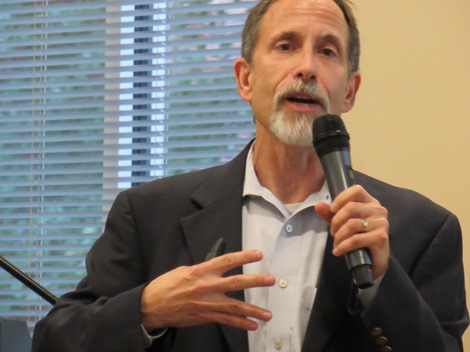
About the coverage gap
Sheldon Weisgrau, director of the Health Reform Resource Project, said KanCare expansion is vital for the health of Kansans and for the economic vitality of Kansas communities. Expansion will bring a lot of money and jobs to the state, including Wyandotte County, he said.
Weisgrau said six of 10 people in the nation get their medical insurance from work, while others are enrolled in programs such as Medicaid that serve low-income people, and still others buy their health insurance in the health care market.
Individuals who make more than $12,000 a year or a family of three that makes $20,000 a year, at the federal poverty level, qualify for federal subsidies to help pay for their private health insurance, he said.
Those who are very low-income may qualify for the current KanCare program, he said. However, those individuals must be both low-income and also fit into a special category, such as low-income and disabled, or low-income and frail elderly, he said. Income requirements for different categories are different, he said.
“Kansas has among the lowest income eligibility requirements in the country,” he said. Low-income adults with no children are not eligible for KanCare, he said. Parents have to be below 33 percent of the poverty level to qualify, he said. For example, a single mother with two children would have to make less than $6,600 a year in Kansas to qualify for KanCare, he said. That means she would work less than half-time at a minimum-wage job, he said.
“The way we have set up this program also means we have given her a big disincentive to actually go out and get a better job,” Weisgrau said. If the single mother of two gets an offer of a full-time minimum wage job, without health insurance, she has to make a decision whether to take the job and lose her health care, or should she stay unemployed or at her minimal job and keep her health care, he said.
With the expansion of KanCare, that single mother would be able to make about $28,000 a year and still stay in the program, he said.
The coverage gap is in the middle of the two groups, the KanCare group and the group eligible for federal subsidies, he said. The U.S. Supreme Court has ruled that the federal government cannot compel states to adopt Medicaid expansion, and in Kansas that means 150,000 residents make too much to qualify for KanCare, and not enough to qualify for federal subsidies for those who purchase insurance, he said.
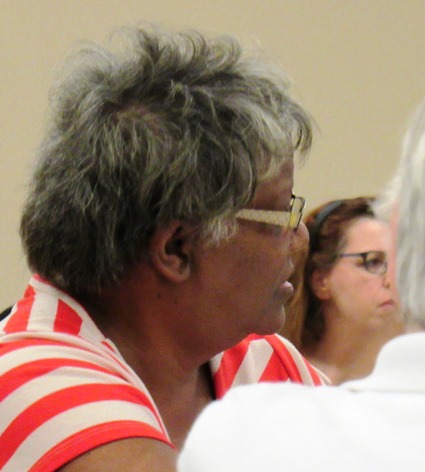
The politics of KanCare expansion
While 31 states have adopted Medicaid expansion, Kansas has not, and it is in a class almost by itself in that it did not allow discussion in the state Legislature of the issue, he said. Three Republican members of the House Health and Human Services Committee advocated for discussion of the issue, and they were removed from the committee, he said. The three, a physician, a pharmacist and a health care foundation employee, knew the most about health care having worked in the field.
The Vision 2020 Committee got the KanCare expansion bill out of the committee the year before, it died on the floor of the House, and the chairman of the committee was removed, he said.
“We have a leadership in Topeka that will not even allow us to talk about this issue,” Weisgrau said. That makes Kansas different from states such as Oklahoma that haven’t passed Medicaid expansion, but are discussing the issue, he added.
That’s why the community forums are being held, so that residents will talk to their legislators about expanding KanCare, he said.
Weisgrau said Medicaid expansion can be accomplished in a budget-neutral way in Kansas. Currently, states pay about 44 percent of the Medicaid bill, with the federal government paying the rest, he said.
The federal government paid 100 percent of the Medicaid expansion costs in 2014, 2015 and 2016, he said, but Kansas did not sign on for the expansion then. For future years, the state would pay 5 percent next year and eventually 10 percent, he added.
Weisgrau said that expanding KanCare would mean that the state could reduce what it is paying to other programs. For example, the state pays health departments for uninsured people, for safety net clinics, to mental health centers and other services for uninsured people, he said.
“Other states that have expanded their Medicaid programs have saved hundreds of millions of dollars in those other parts of their budget,” he said.
“As of 3:38 p.m. today (Thursday), the state of Kansas has given up nearly $1.4 billion in federal funding that would have come to this state to pay for health care services,” he said.
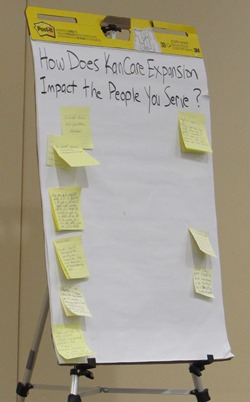
Who benefits from KanCare expansion?
Two groups of people would have been served by the Medicaid expansion, those who are already getting services and are not able to pay for them, and those who are not getting any services, he said. With new people coming into the health care system, more people would be hired in health care, and the businesses around the community that serve health care also would benefit, according to Weisgrau.
A study estimated 3,800 new jobs in the state of Kansas for Medicaid expansion, but seeing the experiences of other states, it is likely that more jobs than that would be created, he said, maybe 5,000 to 10,000 new jobs in Kansas.
Since every hospital in Kansas provides care to people who cannot pay their bills, a Medicaid expansion would provide a big economic benefit to every hospital, he said.
“We have more than 30 rural hospitals in the state of Kansas that are considered to be financially vulnerable,” he said. One of the reasons they are on the financial edge is that they are missing out on all the funding that would come with KanCare expansion, he said.
A hospital in Independence, Kan., closed down last year, costing 190 jobs, he said. The town lost its hospital. Medicaid expansion would have meant $1.5 million for that hospital, he said, giving it more time to figure out a solution to its financial problems.
After the hospital closed, all the town’s local doctors left, he said. Health care systems from Oklahoma and Missouri sent their doctors there a few days a week. When they need to go to the hospital, the Independence, Kan., residents may be sent out of state to other hospitals, he said.
It is not likely that new businesses will move to that town, now that there is no hospital and less health care there, he believes.
Weisgrau said KanCare expansion has some financial benefits to residents, as it can protect them from financial risk. In expansion states, people have less medical debt, less of their debt is sent to collection agencies, and they have better credit scores, he said. That means the residents will have a better chance of getting a job when their credit scores are checked during the job application process.
He said he hears that legislators want to create a path out of poverty for people. Having less debt and a better credit score is a path out of poverty, he said. Not having to decide whether to pay for medical bills or for food is a path out of poverty, he said.
People in expansion states also have lower mortality rates, he said.
About $4,200 a year is spent per person on KanCare, and with 11,759 uninsured persons in Wyandotte County, that would mean nearly $50 million a year would be spent on health care in the county with a KanCare expansion, he said.
It would result in about 315 new jobs, he said. It has a huge economic impact in Wyandotte County, he said, beyond the health care benefits.
Weisgrau said polls have shown 60 to 70 percent of Kansans support KanCare expansion. He urged people to contact their state legislators to advocate for KanCare expansion.
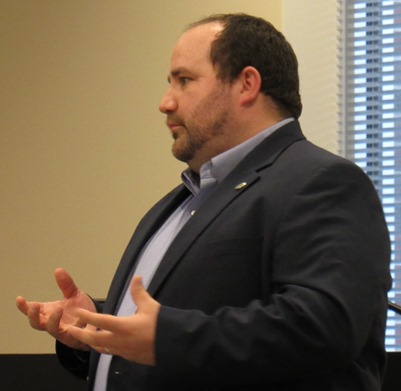
‘Putting people before politics’
David Jordan, executive director of the Alliance for a Healthy Kansas, said Kansas is failing to put people before politics. There will be at least 13 new senators next session, he said, and he believes a majority of them will support expanding KanCare.
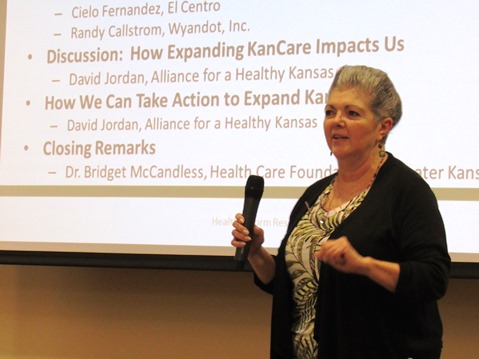
Cielo Fernandez of El Centro said that she sees the reality of no Medicaid expansion on a daily basis. Some clients do not understand how to access the safety nets, she said.
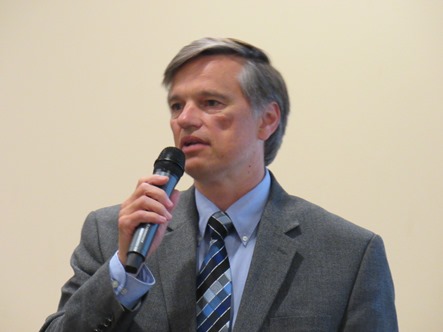
Randy Callstrom, president of Wyandot Inc., said KanCare expansion would help the business side of the community mental health center immensely. (Staff photo by Mary Rupert)
Randy Callstrom, president of Wyandot Inc., said KanCare expansion would help the business side of the community mental health center immensely. Wyandot Inc. served more than 9,300 clients without insurance last fiscal year, he said, about $4.7 million worth of care. Wyandot Inc. receives state funding for the uninsured, but even with those funds, it experienced more than $1.5 million in uncompensated care last fiscal year.
He described a client who was homeless and had a bipolar disorder. Once he was treated he became stabilized with medication, he said. However, he fell into the coverage gap, Callstrom said. He did not qualify for disability services because he was able-bodied enough, he said.
He did not have enough money to pay for his medication, so he did not receive his medication, he said. He cycled back to depression and lost his job and housing, ending up homeless again, and the cycle repeated. Because he also had high blood pressure and couldn’t afford the medication, he ended up in the emergency room with hypertension, when really all he needed was the money to pay for his medication, he said. That is how Medicaid expansion could help Wyandot clients.
At a crisis stabilization center that Wyandot runs, RSI, more than 70 percent of the clients in the past two and a half years were uninsured, he said. The center received grant funding for its support. RSI saved the community and state significant money it would have spent on more expensive hospitalization.
But if compared to the Medicaid expansion state of Arizona, where crisis stabilization centers were funded completely through Medicaid, the similar centers are funded completely through Medicaid, he said. It’s a significant reduction to the state’s responsibility to pay for health care, he said.
The benefit plan associated with how KanCare is expanded is critical, he said. A limited benefit package would help cover the expenses of medication and hospitalization, but may not cover many of the mental health services that are needed, he said, such as case management and social services.
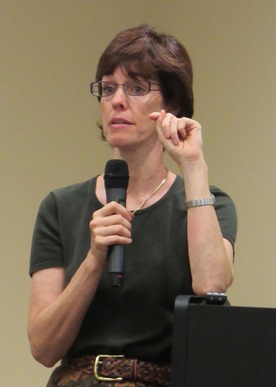
‘The winds are changing in Missouri and Kansas’
Dr. Bridget McCandless, president and CEO of the Health Care Foundation of Greater Kansas City, pointed out there is a difference between what society can do together and what a philanthropic organization can do. Medicaid expansion can mean over $300 million in the area the foundation serves, and the foundation can give $20 million.
Once those Medicaid expansion dollars are received, the foundation could get back to creative work of prevention instead of funding the primary health care.
It is important to talk to people about Medicaid expansion and advocate for it, she said.
“There is a real hope for Medicaid expansion,” she said. “The winds are changing in Missouri and Kansas. This is the time to do that really important final step work.”

